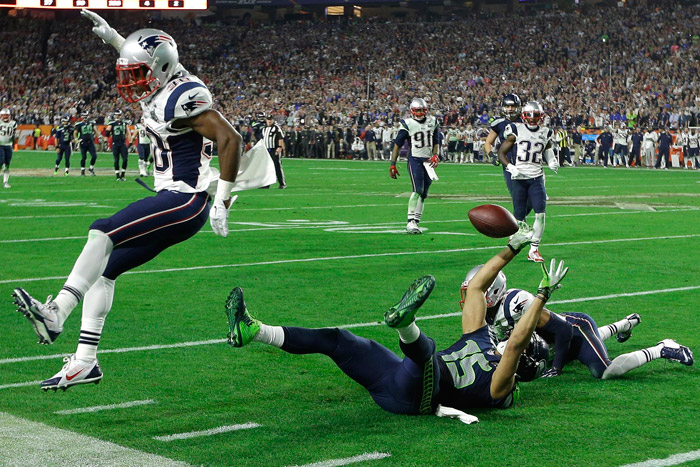In Super Bowl XLIX, when Russell Wilson’s pass was tipped by Malcolm Butler and somehow corralled by Jermaine Kearse—after Kearse had been knocked down and left squirming on the turf—it seemed too impossible to actually be happening. Sure, there was the difficulty of the catch itself, but that was only a small part of the disbelief that spectators were likely feeling when they saw it. As even the most casual of football fans will be able to tell you, the absurdity of Kearse’s catch had little to do with its degree of difficulty–it’s that they had seen it all play out like this before.
Unlike movies or WWE wrestling, professional sporting matches are unscripted events that can play out in a near infinite number of ways. There’s still a dramatic element involved, but it’s usually a self-contained drama that arises from a tight game going down to the wire—like a tense sitcom plotline that will have completely vanished by the next episode as characters return to their ultimately unchanged world.
From time to time, however, these arbitrary game-to-game narratives stack up just right, reaching into the well of history and pulling out a storyline that blows any movie out of the water. Kearse’s catch came against Bill Belichick and Tom Brady’s New England Patriots, who had a four-point lead with approximately 75 seconds remaining, in a Super Bowl taking place in Glendale Arizona—every single one of those conditions was also in effect when the New York Giants’ David Tyree made his improbable ‘Helmet Catch’ in Super Bowl XLII that doomed New England’s perfect season. On top of that, the Patriots had lost Super Bowl XLVI to the Giants as well when Mario Manningham pulled in a ridiculous sideline catch on the game-winning drive. The eerie similarities that characterized Kearse’s catch even continued off the field, as the integrity of the Patriots’ season was being challenged by ‘Deflategate’ in the same way that their season leading up to Super Bowl XLII was tainted by Spygate.
As it happened, rather than surrendering a game-winning touchdown and blowing their third title game in eight years, Butler intercepted the next pass Wilson threw, and vaulted the Belichick/Brady era into a new dimension of greatness. That wasn’t just an isolated game-changing play—it was Andy Dufresne crawling through a river of shit and coming out clean in The Shawshank Redemption; it was Harry Potter walking into the Forbidden Forest to meet Lord Voldemort, knowing that Dumbledore intended him to die, and then actually returning to life to defeat his nemesis. In Super Bowl XLIX, events unfolded in such a precise way that the Patriots went from watching their worst fear play out for the third time to miraculously exorcising every single one of their post-Spygate demons—it was a perfectly scripted situation that happened all on its own.
There may never be another sports narrative that rivals the Patriots’ in terms of producing such unbelievable recurring moments, but it’s hardly the only one to be layered with heightened dramatic circumstances on a big stage. When the Green Bay Packers won the Super Bowl in 2011, they were up by six points in the final minute of play and stopped a potential game-winning drive by the Pittsburgh Steelers. But when the two teams met in the previous season, the Steelers won that matchup with a game-winning drive in which they were—you guessed it—down by six. Most sports fans remember Ray Allen’s clutch game-tying three-pointer in Game 6 of the 2013 NBA Finals against the San Antonio Spurs, but what they probably didn’t know is that the 2005 Seattle Supersonics lost a series to the Spurs in Game 6 when Allen missed a potential game-winning three with Tim Duncan in his face. The irony? Allen’s 2013 shot only happened because Duncan was inexplicably left on the bench and Chris Bosh easily grabbed the rebound that was kicked out to Allen for the three-pointer.
These types of narratives aren’t always redemptive though. Brett Favre came out of retirement (for the second time) in 2009 and tried to lead his former team’s archrivals, the Minnesota Vikings, to a Super Bowl. However, his playoff run ended the exact same way it had with the Packers two years earlier: With him throwing a costly interception in overtime during the NFC Championship game. In 2011, millions of Canadians were hoping for Roberto Luongo to lead the Vancouver Canucks to a Game 7 Stanley Cup victory in the same building where he had led Team Canada to an overtime win the year before in the gold medal game. Instead, the Canucks collapsed, extending Canada’s cup drought to 18 seasons.
A great narrative in any form of creative entertainment is a testament to the mind’s ability to craft something compelling, but a great narrative in sports is a testament to the awe-inspiring power of fate. With so much going on in the world, professional sports are moneymaking spectacles that shouldn’t mean anything, but after watching something like the Kearse catch/Butler interception sequence, it can feel like they mean everything.









